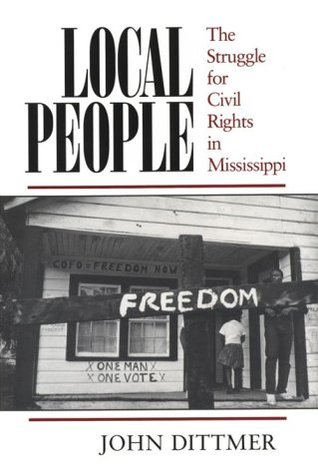

 |

|

The average rating for Local people based on 2 reviews is 5 stars.
Review # 1 was written on 2008-02-12 00:00:00 Jeff Kuiper Jeff Kuiperprobably the best book on the civil rights movement I have ever read in my life. If you are at all interested in this topic, by all means, buy, borrow or steal a copy of this book. On page 423, the author notes the following: "Blacks had struggled for their freedom in Mississippi since the earliest days of slavery an continue to fight for their rights as citizens down to the present. Still, the period beginning with World War II and ending with the Chicago Democratic Convention in 1968 encompasses the most intensive and comprehensive period of grass-roots organization and protest in that state's history; as a result of that campaign, Mississippi experienced more sweeping changes in the area of race relations during those three periods than at any time since the end of the Civil War." The book's title says it all; it is the story of black Mississipians who often gave their lives in the ongoing fight for civil rights & freedom over the above-mentioned time period. My book is filled with post-it notes, well dispersed throughout the book's 400+ pages but I will only make brief comments on my impressions of this book. What I did not realize before reading this book was that the Mississipi government's (state/local) methods of dealing with anyone connected with Mississippi civil rights programs were virtually totalitarian in nature, called by one journalist "something akin to NKVD among the cotton patches." (60). The State Sovereignty Commission, created in 1956, kept tabs on everyone through wiretapping, bugging, keeping dossiers of anyone who might even be suspected of belonging to or working for any kind of civil rights group. Locally, Citizens' councils began right after the Brown v. Board of Education decision was made in 1954, when talk of desegregating began. But the Citizens' councils went beyond the question of desegregation: it served to promote & ensure white supremacy through whatever means possible -- be it through violence, economic intimidation, whatever. In order to begin to try to secure basic human rights, as well as those afforded to them through the US Constitution, black Mississippians began to fight back. While other blacks had been killed & lost property in their early struggles, it was (as the author notes) the killing of Emmett Till in 1955 which garnered the attention of the country, making an "indelible impression on black teenagers eerywhere." (425) With the help of various organizations (SNCC, CORE) that came into Mississipi to volunteer to help in the fight for civil rights & freedom, the local people were able to organize more of the black population and get them to freedom schools to become more literate to be able to pass the tests set up to block them in their attempts to register to vote or to demand better conditions as human beings. The personal commitments and sacrifices these people had to make are the focus of the book. It sheds light on the Freedom Summer, the various marches for freedom, the hard work of the volunteers, demonstrations & mass movements, but also serves to enlighten its readers on the political plays going on in the background, between the groups helping the locals to fight for their rights, as well as at the top levels of national government, where getting the Federal Government to do anything was often impossible even after numerous deaths & media exposure showing the harsh realities of black life under a white supremacist regime in Mississippi. The politics and power plays among the civil rights activists also gave rise to the "Black Power" movement, something else I did not know. I could go on, but you really should just read this book for yourself. I do have to say that I was reading this book over the Martin Luther King Jr. holiday, and wondered why no one ever thought to make a holiday for Mrs. Fannie Lou Hamer, a REAL African-American hero in the fight for civil rights. Not to belittle Dr. King's efforts, but this woman deserves to have a day of her own. And Fannie Lou Hamer knew when she died that the struggle wasn't over when she noted "...we ain't free yet. The kids need to know their mission." Local People is an outstanding work, and I know I'm going to come back to it again. It takes a while to read, but it is worth every second. |
Review # 2 was written on 2008-05-29 00:00:00 Matthew Prentice Matthew PrenticeWhen you have to read books whether you like 'em or not, it's a pleasure to bump into one you love. Jackie Dirks assigned this as part of a Culture and Society class I took, and I'm so glad she did. The author is an amzing storyteller who seems to squeeze in a lifetime's worth of research without ever boring you. My American Hero is a man I would have never heard of if I hadn't read this book. James Merdith served eight years in the air force, enrolled in Jackson State while he fought to enroll at Ole Miss. After winning the court case, he faced a crowd of 3,000 throwing bottles and bricks- a riot that claimed two lives. He endured the disrespect and graduated in 1963. When he graduated he moved out of Mississippi for years, and who could blame him? But he came back, without advance billing, to achieve a simple feat. Walk across Mississippi. Unfortunately, "the attempted assassination transformed what had been a lonely walk into the last great march of the civil rights years." This book is chock full of American heroes, and tragedies, and things that make you say "I didn't know that happened." A must read for all Americans. |
CAN'T FIND WHAT YOU'RE LOOKING FOR? CLICK HERE!!!